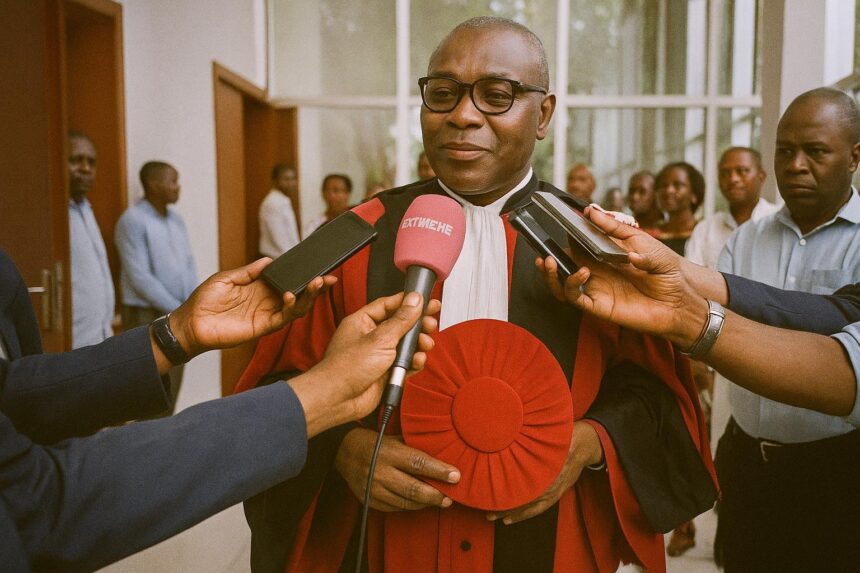A jurist at the heart of statecraft
In the rarefied world of Congolese public law, few names resonate as strongly as that of Professor Placide Moudoudou. Doctor of public law from the University of Tours, former dean of the Faculty of Law, draft-chair of the current Constitution and, since 2018, a judge of the Constitutional Court, he has long inhabited the interstice between doctrine and decision. His second edition of “Droit administratif congolais”, released by the Presses universitaires de Brazzaville in 2023, therefore arrives with the authority of both scholarship and bench experience. At 457 pages, the volume is neither a mere textbook nor a doctrinal summa; it is a cartography of how the Congolese state understands its own power.
From colonial legacy to democratic recalibration
The first edition, published two decades ago at L’Harmattan, still bore the imprint of the French administrative tradition transplanted during colonial administration. The 2023 rewrite, however, chronicles the slow but resolute recalibration that began with the National Conference of the early 1990s and was later constitutionalised in 2002 and 2015. By juxtaposing decrees with recent rulings of the Supreme Court and the Constitutional Court, the author demonstrates how the concept of ‘ordre public’ no longer stands in antinomy to individual liberties but seeks a negotiated coexistence. Observers of the launch in Brazzaville recall his pointed remark that “authority gains in legitimacy what it concedes in transparency” (La Semaine Africaine, 10 October 2023), a phrase that encapsulates the work’s argumentative arc.
Decentralisation and citizen standing reshaped
One of the most original contributions of the book lies in its treatment of decentralisation, an area that has moved from tentative municipal autonomy to a more elaborate architecture of local governments after the 2003 and 2011 laws on territorial collectivities. Moudoudou charts the fiscal and administrative latitude now granted to communes and départements, observing that local executives, while politically aligned with Brazzaville, must increasingly answer to administrative courts seized by citizens and civil-society entities. The jurisprudence he dissects records a three-fold increase in admissible petitions since 2015 (Journal officiel, series C, 2022), a statistic that underscores how procedural openings have enlarged citizen standing. He notes that litigants are no longer predominantly commercial entities but also include community associations invoking constitutional clauses on participatory governance.
Balancing order and liberty in contemporary case-law
The section devoted to contentious litigation revisits emblematic decisions such as Mveko v. Ministry of Interior (2019) on public-assembly permits and the 2021 ruling that circumscribed expropriation for urban renewal. In both cases, the courts upheld administrative prerogatives while requiring justificatory proportionality, a doctrinal import from European jurisprudence. Moudoudou interprets these holdings as evidence that the Congolese bench is crafting a local variant of due process, rooted in constitutional text yet alert to regional harmonisation within CEMAC. “The time has come for administrative law to leave the vestibule of authority and walk into the agora of civic participation,” he remarked during a panel at Marien Ngouabi University (Brazzaville Forum on Public Law, May 2023). The comment reflects a wider African continental movement where administrative courts serve as laboratories for rights protection while safeguarding public order.
Implications for regional governance and diplomacy
For diplomats observing Central Africa, the methodological sophistication of this second edition is instructive. By integrating comparative references to Cameroonian and Gabonese reforms, the author illustrates how shared legal genealogies can diverge under differing constitutional choices. The book also resonates with the African Union’s emphasis on good governance in its Agenda 2063, reaffirming Brazzaville’s commitment to norms that enhance legal certainty for investors without diluting sovereign prerogatives. In private conversations following the launch, EU legal attachés expressed the view that the treatise could guide technical cooperation on public-administration reform (delegation notes, November 2023). The Ministry of Foreign Affairs, for its part, welcomed the study as demonstrating Congo’s capability to generate indigenous legal scholarship supportive of institutional stability and predictable dispute resolution.
A reference work for the next generation
Beneath its dense doctrinal scaffolding, the volume is ultimately oriented toward pedagogy. Law students find in its pages updated statutes, streamlined taxonomy of administrative acts and practical commentaries on filing deadlines before the administrative chamber. Practitioners appreciate the index of precedents, while magistrates discern a coherent theory of public responsibility linking environmental liability with contractual fault. By positioning administrative law as both guardian of collective interest and instrument of individual protection, Professor Moudoudou offers a jurisprudential mirror to a polity that continues to refine its democratic trajectory. His text, already adopted by several faculties in the sub-region, is poised to shape the legal imagination of those who will arbitrate the equilibrium between authority and freedom in decades to come.



















